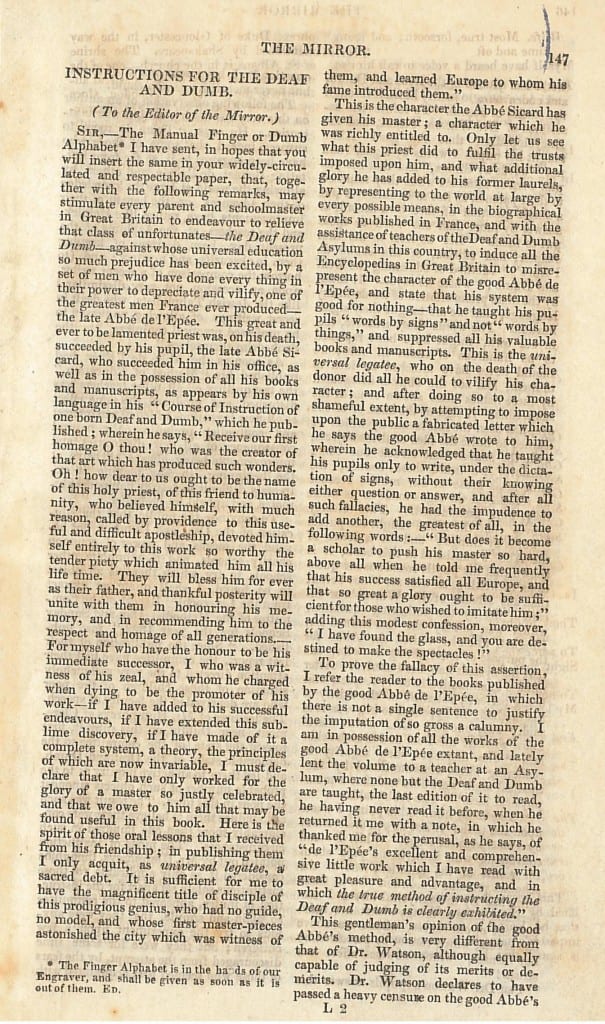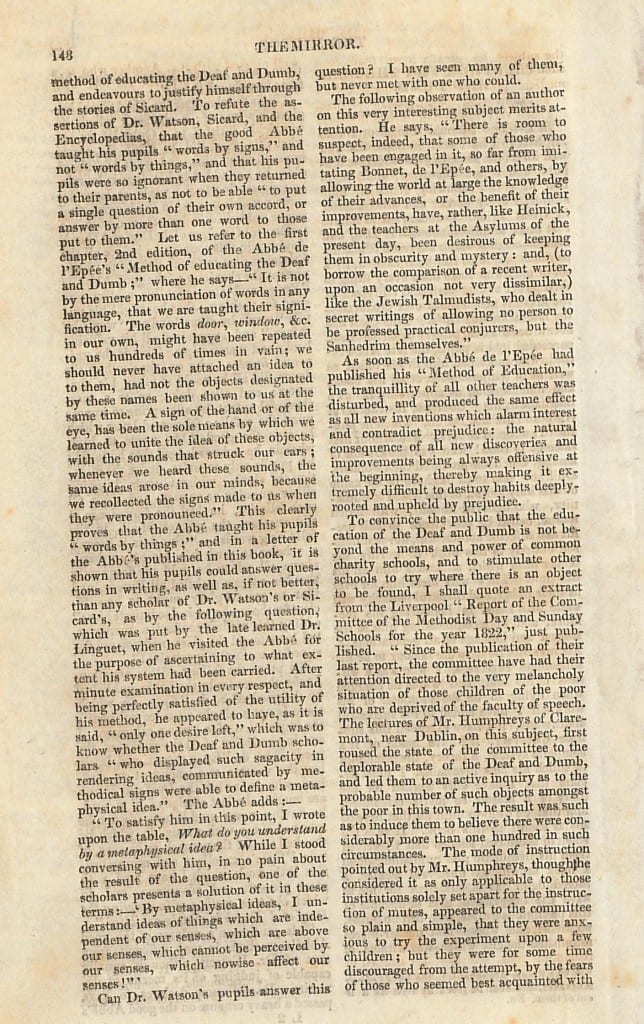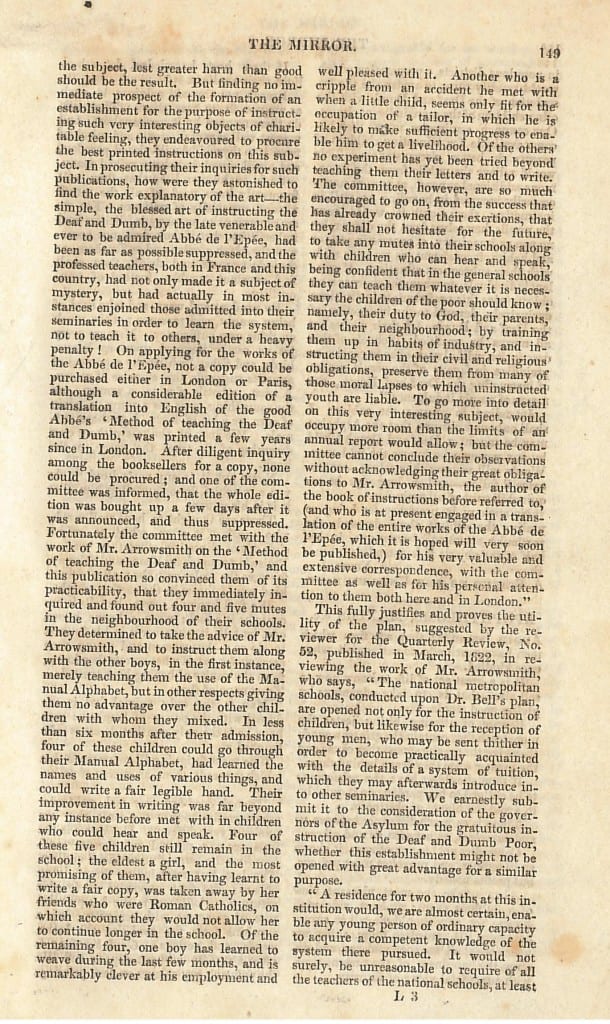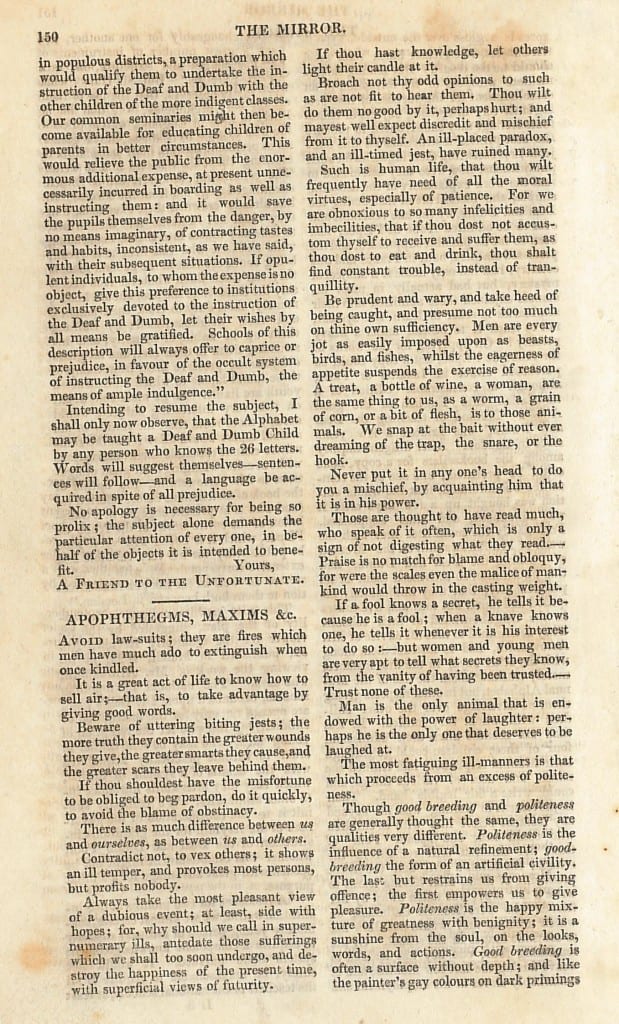“I have found the glass, and you are destined to make the spectacles!”
By H Dominic W Stiles, on 5 June 2015
The Mirror of literature amusement and instruction was an early 19th century journal published from 1822-47 by John Limbird.
 In the March the 6th 1824 edition, this letter appeared, which shows us that even in the early years of what we might call modern education, the methods for teaching deaf children were a deeply divisive issue, and of course not in the hands of the Deaf themselves. It begins with a defence of the teaching methods of the Abbé de l’Épée, saying that Sicard, his heir in deaf education in France, along with others in Britain, misrepresented him, ‘that he taught his pupils “words by signs” and not “words by things,” and suppressed all his valuable books and manuscripts.’ (p.147) Our critic (he signs himself ‘A Friend to the Unfortunate’) goes on to lambast Sicard further, saying he fabricated evidence that said the Abbé ‘acknowledged that he taught his pupils only to write, under the dictation of signs, without their knowing question or answer.’ He continues,
In the March the 6th 1824 edition, this letter appeared, which shows us that even in the early years of what we might call modern education, the methods for teaching deaf children were a deeply divisive issue, and of course not in the hands of the Deaf themselves. It begins with a defence of the teaching methods of the Abbé de l’Épée, saying that Sicard, his heir in deaf education in France, along with others in Britain, misrepresented him, ‘that he taught his pupils “words by signs” and not “words by things,” and suppressed all his valuable books and manuscripts.’ (p.147) Our critic (he signs himself ‘A Friend to the Unfortunate’) goes on to lambast Sicard further, saying he fabricated evidence that said the Abbé ‘acknowledged that he taught his pupils only to write, under the dictation of signs, without their knowing question or answer.’ He continues,
and after all such fallacies, he had the impudence to add another, the greatest of all, in the following words :- “But does it become a scholar to push his master so hard, above all when he told me frequently that his success satisfied all Europe, and that so great a glory ought to be sufficient for those who wished to imitate him;” adding this modest confession, moreover, “I have found the glass, and you are destined to make the spectacles!”
To prove the fallacy of this assertion, I refer the reader to the books published by the good Abbé de l’Épée, in which there is not a single sentence to justify the imputation of so gross a calumny.
Our author tells us he lent a copy of one of the Abbé’s books to a a teacher at a Deaf Asylum (unnamed), who said it ‘the true method of instructing the Deaf and Dumb is clearly exhibited.’ (ibid) He tells us also that Watson of the Old Kent Road Asylum, censured the Abbé basing this criticism on Sicard’s testimony (p.148).
The writer goes on to quote extensively from the Liverpool “report of the Committee of the Methodist Day and Sunday Schools for the year 1822,” which noting the lectures of Mr. Humphreys on the Dublin Claremont Institution, says that the Abbé’s works were suppressed (p.149). They then resolved to take the advice of Mr. Arrowsmith, who had written The art of instructing the infant deaf and dumb… illustrated with copper plates, drawn and engraved by the author’s brother, an artist born deaf and dumb. To which is annexed The method of educating mutes of a more mature age, which has been practised with so much success on the continent, by the Abbe de l’Eppe (together with The manner of instructing the deaf and dumb to articulate) (London: Taylor and Hessey, 1819). We have this book and will take a closer look at that in a future post.
Read though the article if you can, and particularly note the paragraph that begins at the bottom of page 149. Proposing that young men who will become teachers go to the Asylum for the gratuitous instruction of the Deaf and Dumb Poor (I assume they mean Old Kent Road?), to acquire a knowledge of teaching deaf children and the manual alphabet.
A residence for two months at this institution would, we are almost certain, enable any young person of ordinary capacity to acquire a competent knowledge of the system there pursued. It would not, surely, be unreasonable to require of all the teachers of the national schools, at least in populous districts, a preparation which would qualify them to undertake the instruction of the Deaf and Dumb with the other children of parents in better circumstances. This would relieve the public from the enormous additional expense, at present unnecessarily incurred in boarding and instructing them: and it would save the pupils themselves from the danger, by no means imaginary, of contracting tastes and habits, inconsistent with their subsequent situations. (p.150)
The whole article is below.
x
 Close
Close





